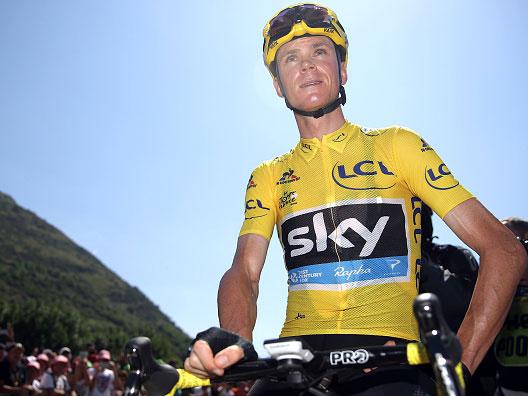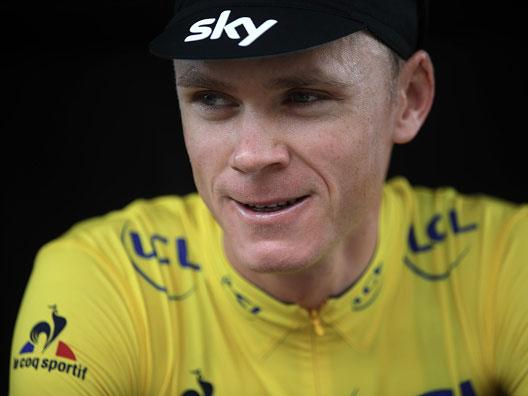Tour de France: Chris Froome has the time and the tools to continue to dominate the sport
ANALYSIS Briton's achievement represents another landmark for Team Sky and he may continue for years to come

Your support helps us to tell the story
From reproductive rights to climate change to Big Tech, The Independent is on the ground when the story is developing. Whether it's investigating the financials of Elon Musk's pro-Trump PAC or producing our latest documentary, 'The A Word', which shines a light on the American women fighting for reproductive rights, we know how important it is to parse out the facts from the messaging.
At such a critical moment in US history, we need reporters on the ground. Your donation allows us to keep sending journalists to speak to both sides of the story.
The Independent is trusted by Americans across the entire political spectrum. And unlike many other quality news outlets, we choose not to lock Americans out of our reporting and analysis with paywalls. We believe quality journalism should be available to everyone, paid for by those who can afford it.
Your support makes all the difference.This (Monday) morning when the barriers are taken away from the Champs Elysées finishing circuit and the dust settles on the very last stage of the 2016 Tour de France, three-times winner Chris Froome will find himself in a new, indisputably higher, location amongst the pantheon of modern-day sporting and cycling greats. But is it possible to say exactly how much higher?
Purely in terms of international cycling, there are some clear records Froome has now achieved. He is one of just eight riders to have triumphed in the Tour three or more times, and the first to take back-to-back wins since Spain’s greatest ever athlete, Miguel Indurain, wrapped up his fifth straight victory in 1995.
This leaves Froome firmly in the second circle of Tour stars, given only four riders have won the Tour three times - himself, Philippe Thys, Louison Bobet and Greg LeMond - and only four others have won it five times - Indurain, Bernard Hinault, Eddy Merckx and Jacques Anquetil.
Reaching that prestigious position further confirms Froome is now, post 2016, the only rider who could currently join four of cycling’s biggest legends and the best Tour de France racer of his generation. It also represents a huge sporting milestone for the Kenyan-born Briton - and for British sport.
2016 also represents another landmark for Team Sky, having now won the Tour four times in five years. The British squad’s domination in cycling’s premier event has been so crushing this July it automatically makes Sky the reference point for all of the sport’s top-tier teams when it comes to three-week stage racing. And to have done so for so long in the Tour - barring 2014 when Froome crashed out - places Sky in a class of their own. (It also makes Sky’s failure to win either of the other Grand Tours an even more intriguing question, but that is another story).
Inside Britain, strangely enough, the points of comparison for Froome’s status are much blurrier, even if you rule out any track success. Froome’s three overall Tour wins to Bradley Wiggins' lone victory give the 31-year-old Sky rider the clear right to be described as the country’s best ever Tour de France racer. But that has to be qualified by saying that Mark Cavendish, as the sport’s greatest ever sprinter, and with 30 Tour stage wins to his name - second only to all-time great Eddy Merckx - is by far the best in his own speciality as well.

This lack of points of reference is an indication, too, of just how quickly British cycling has set itself up as a leading powerhouse in the sport. As little as ten years ago, Britain’s best ever placing in the Tour was one fourth-place overall and its sole final classification triumph, one King of the Mountains title in Paris.The scale of the progress is, simply, huge.
Oddly, perhaps it is easier to get a better historical perspective by looking at what Froome will try to achieve in the future rather than in the past. As Froome says himself, rather than branching out towards trying to win the Classics or the Giro d’Italia, cycling’s second biggest race - and which Wiggins made a spectacularly unsuccessful attempt at victory following his Tour win- he will continue to concentrate on the Tour.
“I will keep coming back for the next five or six years to give it my best shot, to fight for victory again. I’ve won three and I can’t say the novelty is wearing off,” Froome said on Saturday
One of the few big exceptions to making the Tour his key objective of the season is just around the corner in the shape of the 2016 Olympic Games, where Rio’s exceptionally hilly course for the road-race and time trial favours an all-rounder like Froome.
There is also, perhaps, as a more occasional target, the World Championships, where future hilly terrain - as is rumoured in 2018 in Austria - could tempt Froome. Finally there is Britain’s career-long battle to win the Vuelta a España, cycling’s ‘third’ Grand Tour and where Froome has twice finished second. This year, Froome has only said racing the Vuelta this September is ‘possible’, but taking two Grand Tours in one season, the first since Alberto Contador in 2008 in the Giro and Vuelta, would be another major landmark.
But the main challenge remains the Tour. Merckx has said recently that Froome could well win “four, five or six Tours, more than me, even.” With Tour victory number three, the door towards becoming an all-time legend of the sport, therefore, is now open for Froome. But as Cavendish has pointed out, too, even one Tour stage win, let alone three overall victories, can make a rider’s career.
That observation, too, puts Froome’s soaring levels of sporting success into its own glorious context, too.
Join our commenting forum
Join thought-provoking conversations, follow other Independent readers and see their replies
Comments